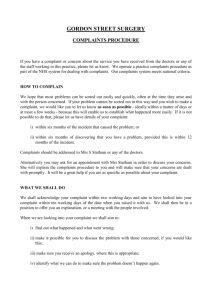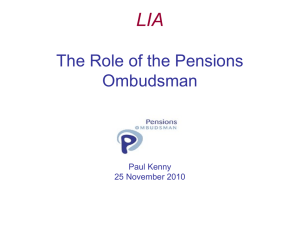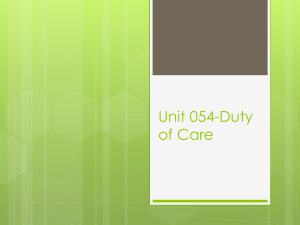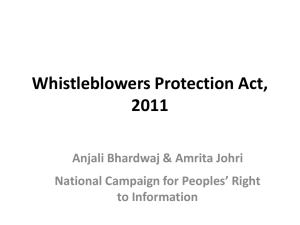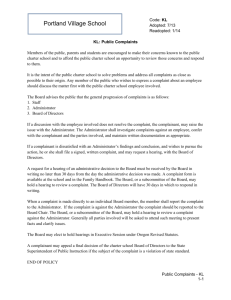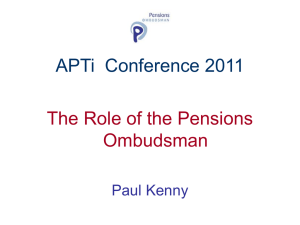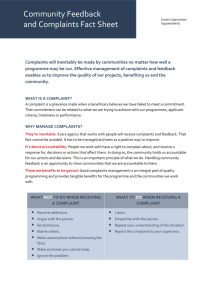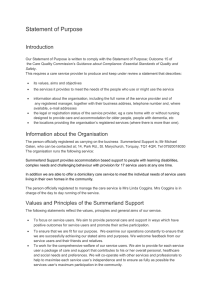Complaint Handling - a Necessary Evil Or, The Ongoing Effects of
advertisement
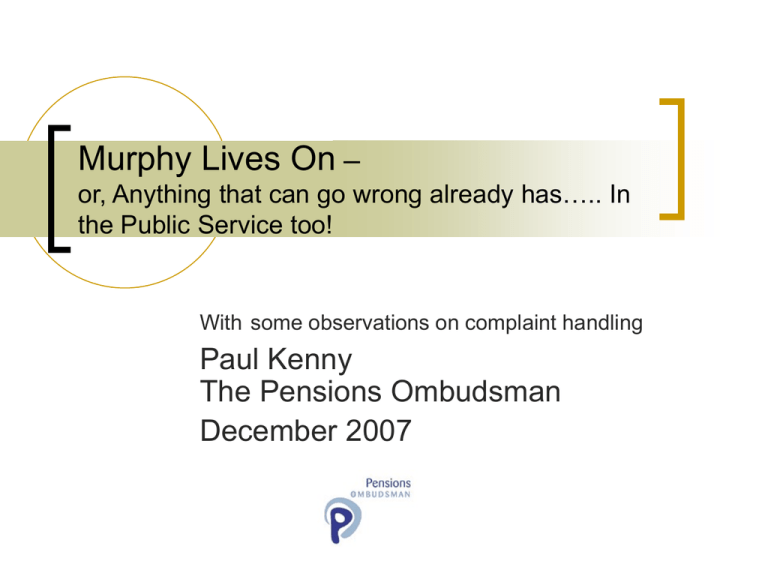
Murphy Lives On – or, Anything that can go wrong already has….. In the Public Service too! With some observations on complaint handling Paul Kenny The Pensions Ombudsman December 2007 When a complaint is made…. Does the Complaint handler…. Lend a sympathetic ear? Attack the complainant? Reach for their Lawyer? Look up their Insurance Policy? Actually look for the facts? Agree that he has a case? Apologise? Refer the complainant to IDR? No Standard Response to complaints Responses vary according to the “complainee” – some organisations more open to complaints than others Culture in some cases is “save money at all costs” – even though there may be injustice And the Complainant Some people are their own worst enemies The nit-picker The Chip on the Shoulder When he cries “wolf”, nobody listens any more Not again! The Worrier But it might happen…. …to name but a few Pitfalls Don’t be tempted to batten down the hatches and hope he’ll go away – he won’t Don’t treat complainants as dangerous lunatics Do acknowledge the complaint and treat it seriously Do try to deal with it as quickly as possible Remember Most people who complain really do feel aggrieved Many feel they have a strong case They may not be correct but should be handled with respect Even habitual complainers A lot of people genuinely don’t know Real “chancers” are rare enough But they do exist An apology? Remember that sometimes an apology is enough (“it’s the principle…”) Complainants need to feel they are being listened to Failure of the scheme /administrator /trustee to reply will escalate the problem People who feel they are not taken seriously feel aggrieved And complain to me One Little Word A missing word – a missing clause “… because….” Many complaints could be avoided by giving an adequate – or a clear – explanation of the reasons for trustees’ or employers’ actions, or the factors that influence a decision More confusion and more complaints result from poor communication than from almost any other single factor. When a complaint arises, keep the lines of communication open Compliance with Disclosure Requirements Most schemes are generally compliant, though there are always some problems The requirements are straightforward (if potentially expensive) Meeting them can be a problem! Because of the weight of regulation, temptation is to tick boxes without regard for clarity of the message Public Service short-cut to disclosure Perils of Communication “You should keep this booklet in a safe place for future reference……” That’s all they ever do The Golden Rule of Pension Communication: Nobody Ever reads the small print Public Service Schemes Generally suffer from poor communication May be worse as you get further from the centre Circulars often incomprehensible – but very accurate! Incomplete information, e.g., contributions to be repaid Problems I shouldn’t have…. Some “complaints” can be disposed of quickly I should not have to write to a complainant explaining the true meaning of a “communication” from scheme trustees But it is the quickest way of closing the matter down A Revolutionary Proposal Any chance of using Plain English? Internal Disputes Resolution in the Public Service Most Public Service schemes are “Public Authority” schemes –but not all Appeal to Minister Possible appeal to Minister for Finance Time limits are a joke Three months will run from when sufficient information received IDR, continued PO does not have power to waive the IDR requirement in a Public Authority Scheme BUT can deem the process to be exhausted within its terms I would prefer not to… but… Public Sector Pensions Administration Unevenness What you get should not depend on what Health Board region you worked in…. Or the whim of some official Lack of experience in pensions matters Knowledge dispersed Career structure Pensions are not sexy! Where there is tight control and specialist staff, far fewer problems Shared Services….. Some complaints are unique to the Public Service Added Years – delays in advising costs; disputes over calculation of added years; requirement for 9 years’ service LGSS: Firefighters and Retirement Age: pay increase, supplementary pension LGSS: Overtime – no consistency Public Service problems 2 Some Equal treatment cases fail for lack of valid comparator Pension Levy – opters-out – and nonpensionable gratuity “Transfers” that are not transfers, and the Spouses’ and Children’s scheme Sessional Employees and the Health Service Public Service problems 3 Allowances often the subject of dispute Service with grant-aided bodies Co-ordination with State Pensions Old Widows’ and Orphans’ schemes LGSS 1956 Act Scheme – preservation Attempts to fetter discretionary powers Public Service problems 4 Divorce and Separation – Pension Adjustment Orders In Public Service, 6 orders may be needed Death Before commencement of Benefit – an insane situation Not all complaints are serious - to start with Some should never get to my office, but escalate due to Poor communication – both ways Lack of knowledge of trustee duties Failure to take complaint seriously And some were never serious in the first place Failure to switch investment in less than 5 days Thursday to Monday!! The Great PO Robber QUESTIONS? The Pensions Ombudsman 36 Upper Mount St Dublin 2 Phone: 01 647 1650 Fax: 01 676 9577 info@pensionsombudsman.ie www.pensionsombudsman.ie
